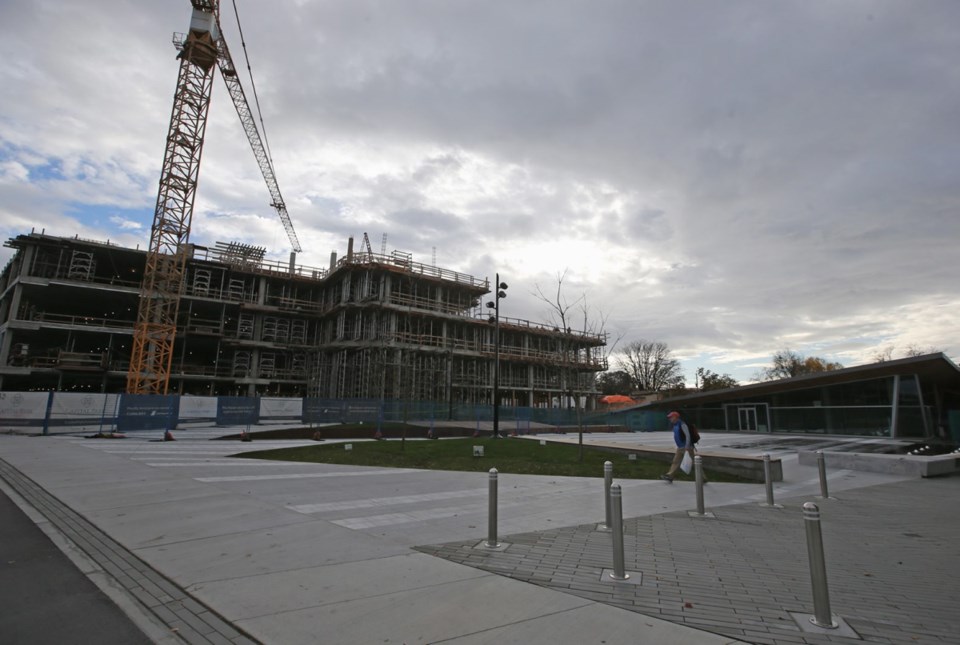New housing development in Victoria will grind to a stop if city councillors push ahead today with a proposal mandating “affordable” units in all new condo projects, warns the Urban Development Institute.
“I don’t know what their agenda is. If it is building affordable housing, this is not the way to do it,” said Kathy Hogan, UDI executive director. “This will actually do the opposite. This is going to stop development so nothing will be built.”
In September, the previous council postponed consideration of a proposed Inclusive Housing and Density Bonus Policy — which some councillors didn’t think went far enough — pending further consultation with the UDI and other stakeholders.
But a motion being brought forward today by councillors Ben Isitt and Jeremy Loveday is recommending that that the policy be resurrected and used immediately as the foundation for negotiations with developers wanting to build in Victoria, pending further consultation with stakeholders.
Isitt said he and Loveday were careful not to suggest the city adopt the policy but rather that it be used as a starting point for negotiations while consultation continues.
Isitt said purpose-built rental would be exempt but conceded the measure could have an impact on “expensive strata housing.”
“The problem is that Ms. Hogan’s members are not building housing that’s priced at the level to meet the needs of most of our residents,” Isitt said.
“The goal is not to stop development. The goal is to ensure the impacts of new development in terms of gentrification and escalation in the cost of land, that those impacts are offset by amenities in the form of affordable units.”
Hogan called Isitt and Loveday’s proposal “a slap in the face.”
The UDI is urging its members to write to council to express their concerns about the proposal. “We really wanted to work collaboratively with the city,” Hogan said, noting that working toward affordability is a priority for all, including the UDI.
“We wanted to work with them and now they’re going to implement this without consulting with us any further.”
Mayor Lisa Helps has called for “bold action” on the housing front, but she agrees that rushing to implement a policy without adequate consultation would be counterproductive.
“If that policy is adopted on Thursday it’s not going to create new housing. It’s going to stop the creation of new housing,” Helps said, adding that she thought the decision of the previous council to consult with stakeholders was the right one.
“Staff were directed to go away and do further consultation to figure out what kind of inclusionary housing policy would bring forward the most number of units,” Helps said.
Rather than creating an “us versus them” situation, Helps would like to see a working group including UDI, non-profit housing providers, the Victoria Tenant Action Group and city staff convened to come up with workable proposals.
The city has already established a March 31 deadline to implement a new policy, so something will be put in place, she said.
“I think rushing forward Thursday with this policy is not going to get the kind of outcomes we want, which is more affordable housing,” Helps said.
But Isitt wants to act now. “I don’t think residents can wait,” Isitt said. “Each project that provides exclusively expensive housing, I think, is a huge missed opportunity and I don’t want to see another five months of missed opportunities.”
Under the proposal, between 10 and 15 per cent of units in new Victoria condo projects would have to be built as affordable rental units.
The UDI says it needs clarification on a number of provisions of the new policy such as how it affects purpose-built rental projects, what the cash in lieu provisions are, and what benchmark is being used as a base for determining additional density.
The proposal would provide developers of projects with fewer than 40 units the option of making a cash contribution in lieu of including affordable units.
In developments of 40 units or more, the affordable units would be required.
Hogan said the proposal is simply not doable.
“It’s a myth out in the community that developers all make billions and millions of dollars off these projects. They don’t,” Hogan said.
“Margins are very, very tight and when you have a policy like this that comes in, it makes it impossible for the numbers to work.”



